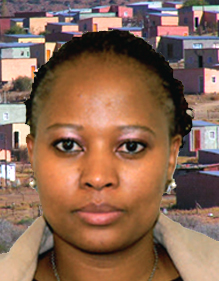|
Getting your Trinity Audio player ready...
|
 By Janine Erasmus
By Janine Erasmus
To date Corruption Watch has received around 170 reports of alleged corruption in the housing sector – the majority from Gauteng, Mpumalanga and the Western Cape. Gauteng’s metropolitan municipality of Ekurhuleni has the most complaints, followed by the cities of Johannesburg and Cape Town.
Gauteng has the greatest demand for government housing in the country as it has the highest population, despite being the smallest province geographically, and most of the complaints sent to us centre on the issue of allocation. The job of the national Department of Human Settlements is complicated by irregularities such as queue jumping, land being sold illegally, and officials and citizens abusing the system for their own benefit.
As head of the Gauteng human settlements department's anti-fraud and corruption unit (AFCU), it’s part of Papadi Makhetha’s job to help ensure that these irregularities don’t happen in the province. This former forensic investigator has a background in law – she now oversees all the functions of the AFCU, including ethics management; Investigations and monitoring; complaints; education and capacity; and fraud risk management.
Makhetha joined the AFCU in 2008 and in the six years since she can say with certainty that she’s seen a drop in both internal and external corruption, thanks to the work of the unit. Members of the public can contribute by reporting corruption via the National Anti-Corruption Hotline on 0800 701 701.
We interviewed Makhetha as part of our Women’s Month series that shines a light on women working against corruption. Read the first three pieces in the series, on Mmanaledi Mataboge, Gabriella Razzano, and Nicky Rehbock.
What is the function of the AFCU?
We ensure that there is policy and ethics management in the Gauteng Department of Human Settlements. We also implement the department’s anti-fraud and corruption strategy and programmes, which are there to prevent, detect, deter and investigate all acts of fraud and corruption. Our mandate can be summarised as follows:
- The investigation of all allegations of fraud, corruption and maladministration within the Department of Human Settlements;
- Management of ethics through creating and promoting a culture of ethical conduct in the department;
- Education and awareness on ethics, fraud and corruption;
- Fraud risk management.
What is your specific responsibility?
I provide oversight to make sure that programmes are fully implemented, in line with the policies that we’ve established.
Among other tasks, I ensure that the business strategies of the unit are fully aligned with that of the department, and enhance the performance of the department in line with the performance plan. I manage and report on all fraud risks within the department and ensure that periodic fraud risk assessments are conducted.
I also draft, review and implement the department’s anti-fraud and corruption strategy, its prevention plan, and the unit’s business plan. I create and manage the budget for operations within the unit.
It’s also my job to build and foster relationships with all law enforcement agencies and relevant stakeholders.
Is this a job that you voluntarily applied for?
Yes – I have a background in law and for a while I worked as a forensic investigator in the private sector, for Gobodo, where we had a number of government clients. Then I was in the SARS enforcement team for a while as a forensic investigation specialist. I’m passionate about anti-fraud and corruption, and my current position gives me a broader perspective on the issue. I’m able to have a wider influence throughout the provincial government.
What do you find to be most rewarding aspect of your job?
That the anti-corruption unit helps and supports the department in fulfilling its core mandate of delivering on human settlements. At the same time we safeguard the interests of communities, giving dignity to people by providing them with shelter and access to basic services, and building inclusive and integrated communities.
Corruption in the department of human settlements is perceived to be quite rife, with issues such as queue jumping and stands being sold illegally, but we ensure that there is integrity in the process.
Can you say that things have improved in the years that you’ve been with the anti-corruption unit?
Things are definitely a lot better than they were six years ago. We do have challenges – people are always trying to find new ways to beat the system. But we now take a proactive stance towards corruption, rather than being reactive. We have a zero-tolerance policy and we have dealt with officials, made dismissals, cancelled contracts.
We’ve succeeded in putting control measures into place and we have an integrated system which is connected to Home Affairs, the deeds office, and other public sector systems. So we can quickly and properly ensure that applicants do meet the requirements.
We’ve built good working relationships with the National Prosecuting Authority, police and the Hawks. This work has resulted in a lot of convictions.
In terms of procurement, we have cleaned up our act. We now have three committees and the people sitting on those committees are properly vetted. They make their financial disclosures and there is no conflict of interest – so we don’t do business with suppliers connected to officials.
However, in terms of actual delivery of houses, our work has not yet made an impact but we are making strides. Our work is all geared towards supporting our housing delivery, making it more efficient for the right people.
How do you plan to keep this up?
We can’t rest now, although these systems have reduced internal and external corruption. We must continue to work hand in hand with bodies such as the SAPS, and we also want to work more closely with organisations such as Corruption Watch, especially when you go out into the communities. We understand the magnitude of the problem, and we want to co-operate in bringing a solution.





